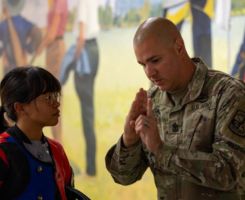Congress expands Army JROTC instructor eligibility
Historically, JROTC instructor positions were limited to retirees. With the new changes under the NDAA, recently separated officers and noncommissioned officers who served honorably for at least 10 years, who reached the grade of E6-E9, WO1-CW5, or O3-O6, and who possess an associate degree or higher can now apply to be an Army JROTC instructor. Service members serving in the U.S. Army Reserves or the Army National Guard are also eligible given they meet the time in service, grade, and education requirements.
Along with the changes in instructor eligibility, a new pay model has been implemented to account for non-retiree JROTC instructors, with pay now based on rank, education level, type of position, and school location.
While JROTC provides plenty of opportunities to hone hands-on skills like marksmanship, drone piloting, or robotics, it’s the less tangible skills that are the most meaningful according to instructors.
Retired 1st Sgt. Cinnamon Chambers has been a JROTC instructor at Scarborough High School in Houston, Texas, for the past four years. Chambers considers her role as an instructor an equally valuable experience.
“They’ve taught me more patience and they keep me on my toes. They make me laugh every day,” she said. “They question a lot of things that I thought I knew but I don’t because things have changed over time. They keep you young. They make me a better person, a better mom to my own kids, and a better wife for my husband because they keep me well-rounded,” Chambers said.
Prior to teaching JROTC, Chambers had a 23-year Army career with opportunities to serve as a drill sergeant and a combat medic. She knew early on in her career that after retirement, her post-Army career would involve JROTC. A former Marine Corps JROTC cadet herself, Chambers volunteered to judge drill competitions when stationed at Fort Cavazos, Texas. While volunteering, she would receive job offers from instructors, but couldn’t accept until she made her retirement goal.
“When I got stationed in San Antonio my last three years in the military before I retired as a First Sergeant, I was still judging drill competitions and I was like, ‘You know what? This is exactly what I want to do, and I applied.’”
While the choice to become an instructor was easy for Chambers, she knew the job itself held high expectations.
“These aren’t soldiers. That’s the hardest transition…that these are not soldiers. You have to put in the time for these kids. You can’t just show up and say, ‘I’m just going to teach, read off some slides, and then go home at the end of every day.’ It doesn’t work that way,” she said.
While teaching today presents many challenges, JROTC instructors’ efforts do not go unnoticed by their cadets.
Cadet Angel Montelongo is a senior and the commander of the Scarborough Armed Drill Team. He’s been a member of the Spartan Battalion all four years of high school and has learned many lessons about leadership and perseverance from his JROTC instructors.
“They’re very dedicated in what they do. They have a lot of passion. It takes a lot to come into work every day and do what they do,” Montelongo said. “They help you with letters of recommendation, colleges, whatever you want to do with your life they help you.”
“Sometimes things can be rough in life, but they have taught me as long as you keep your head up and keep a positive slate on your mind that you’ll accomplish anything. They’ve instilled that in each and every one of us. I really appreciate them for that.”
Cadet Valerie Matha, commander of the Panther Battalion at North Crowley High School in Fort Worth, Texas, attributes her new sense of identity to her instructors.
Matha’s instructor, retired Master Sgt. Gene Bass, believes all his students show promise, but it falls on the instructor to assist in finding the cadets’ skills.
“Each and every one of them has the potential to be great. You’ve got to light that fire underneath them so that they figure out what they do best. It’s an amazing feeling to see a cadet come into the class, not knowing what they want to do and then by the end of their senior year they know exactly what they want to do, how to get there, and how to get it done,” said Bass.
For those interested in pursuing a career as a JROTC instructor, Chambers believes the experiences gained in the Army will benefit their teaching in the long run.
“You can still use a lot of your military knowledge and expertise to coach, teach, and mentor students. It translates, just the way you deliver it is going to be a little different,” she said. You’re a civilian now. Enjoy the fact that you’re a civilian coaching, teaching, and mentoring young people to be our motto-better citizens.”
For more information on Army JROTC instructor opportunities visit https://www.usarmyjrotc.com/employment-faqs/
Article Source: https://www.army.mil/article/277088/congress_expands_army_jrotc_instructor_eligibility
